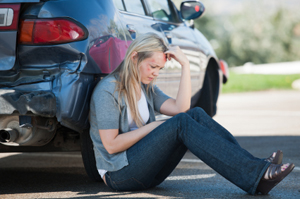
Post-traumatic stress disorder (PTSD) is a relatively common mental health condition that develops in response to a particularly stressful event. Of the millions of people who are involved in car accidents in the U.S. each year, about 39.2% of them will experience symptoms of PTSD.
The symptoms of PTSD may develop soon after the traumatic incident or not until months later. They differ from one person to the next, but may include flashbacks, nightmares, relationship problems, memory deficits, apathy, feeling emotionally detached, or experiencing severe emotional distress upon experiencing something that reminds the person of the accident.
PTSD can greatly interfere with a person’s daily life and quality of life, but fortunately, there is help available.
Seek help right away
In the short-term aftermath of a car accident, it’s common to experience stressful emotions, such as fear, guilt, anxiety, and depression. These are all normal stress responses to a terrifying event. If you experience any upsetting symptoms, it’s critically important to seek help right away. By reaching out for help soon, you have a greater chance of avoiding long-term PTSD.
Help can mean different things to different people. Some might find comfort in reaching out to a faith organization or talking to family and friends. For many people, speaking with a mental health counselor or psychologist is the most effective course of action. However, some people might hesitate to go this route because of the cost of treatment.
This is one more reason why it’s recommended that survivors speak to a personal injury lawyer as soon as possible after a crash. An experienced attorney can make sure you are in the best position to secure compensation for your medical expenses, including your mental health treatment costs.
Talk to your provider about medications
Psychiatrists and primary care doctors can prescribe medications to help you cope with PTSD symptoms. Typically, medications aren’t considered a replacement for therapy. Rather, they provide relief of symptoms so that you can more readily work through your thought patterns with a mental health counselor or psychologist. Some medication options may include antidepressants, anti-anxiety medications, and medicines specifically designed to suppress nightmares in people with PTSD.
Do remember to disclose your full medical history to your provider before taking any new medications, and bear in mind that an antidepressant or similar drug may require a period of adjustment before the beneficial effects are seen.
Developing healthy coping skills
In addition to psychotherapy, it’s helpful to practice healthy coping skills in your daily life. Many people with PTSD find daily exercise effective. In fact, exercise can help people become more resilient to stress, and it can also lessen the symptoms of depression and anxiety. Outdoor exercise is ideal for mental health.
Feelings of isolation are a hallmark of PTSD, so make a proactive effort to spend more time with others. However, try to avoid planning potentially stressful activities, such as elaborate dinner parties. Go for a walk with a friend, take an elderly relative out to brunch, or sign up for a continuing education class.
Contact car accident lawyers in NY and NJ
The law firm of Kantrowitz, Goldhamer & Graifman, P.C. understand how difficult it can be to move forward after a serious crash. We invite you to schedule a free consultation to review your case and discuss your legal options for securing compensation for your medical expenses, mental health treatment, lost wages, and other damages. Our car accident lawyers serve clients throughout Rockland County, NY, and Bergen County, NJ. Call us today to schedule a free consultation.
